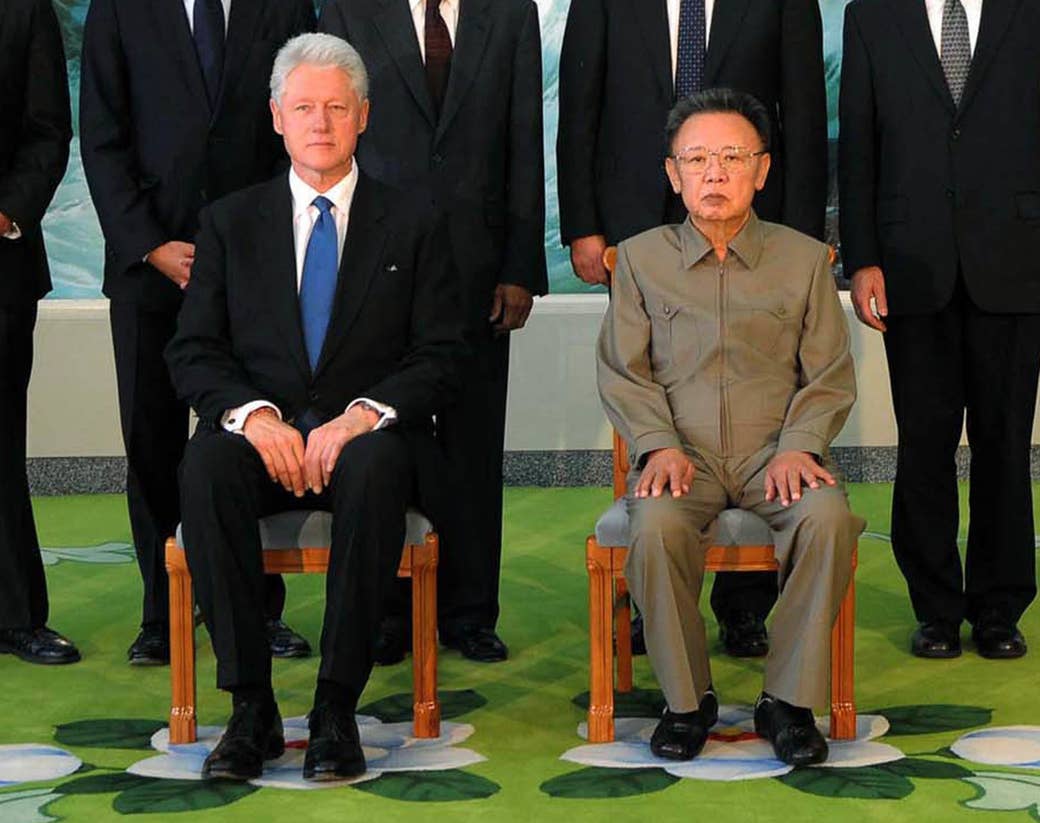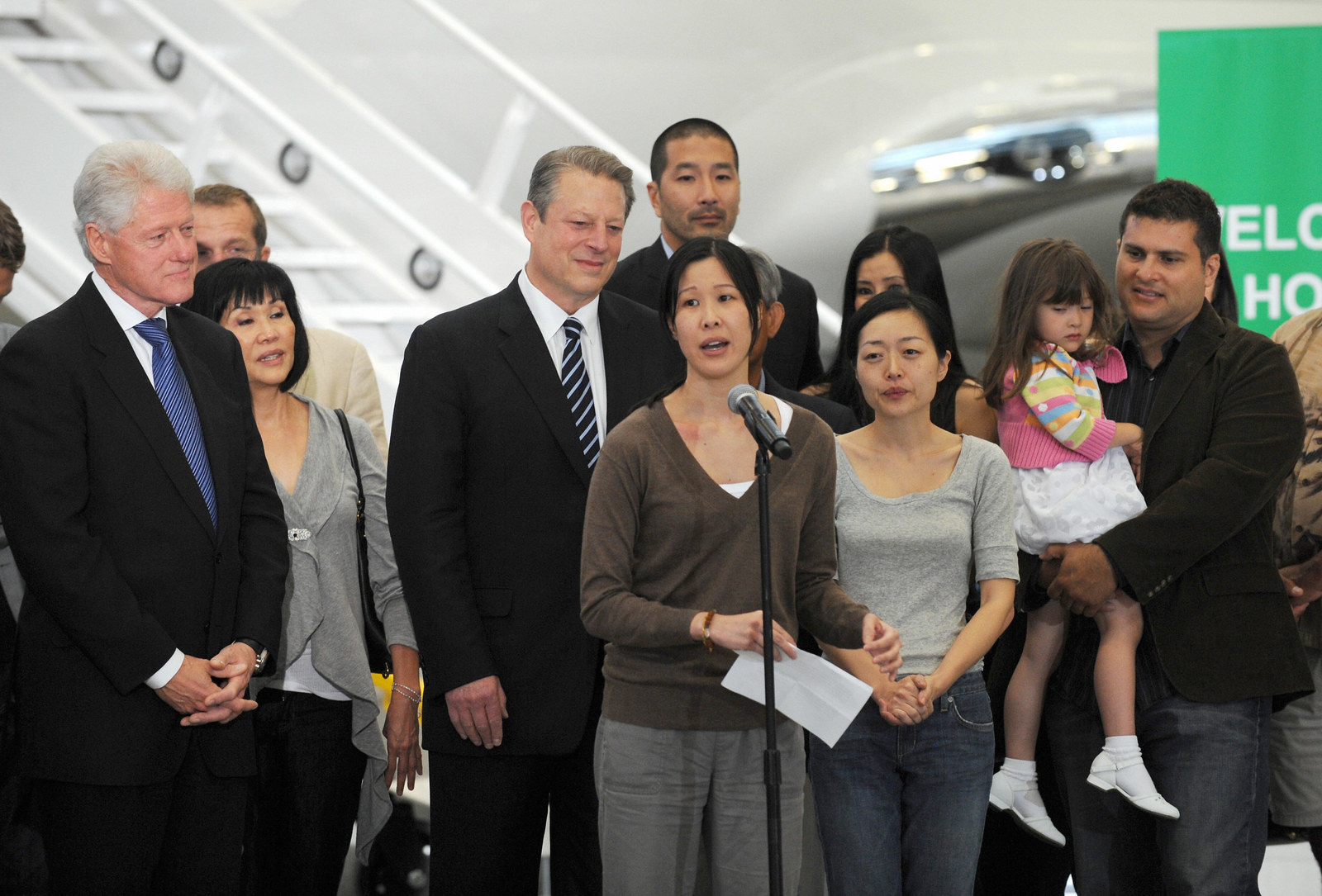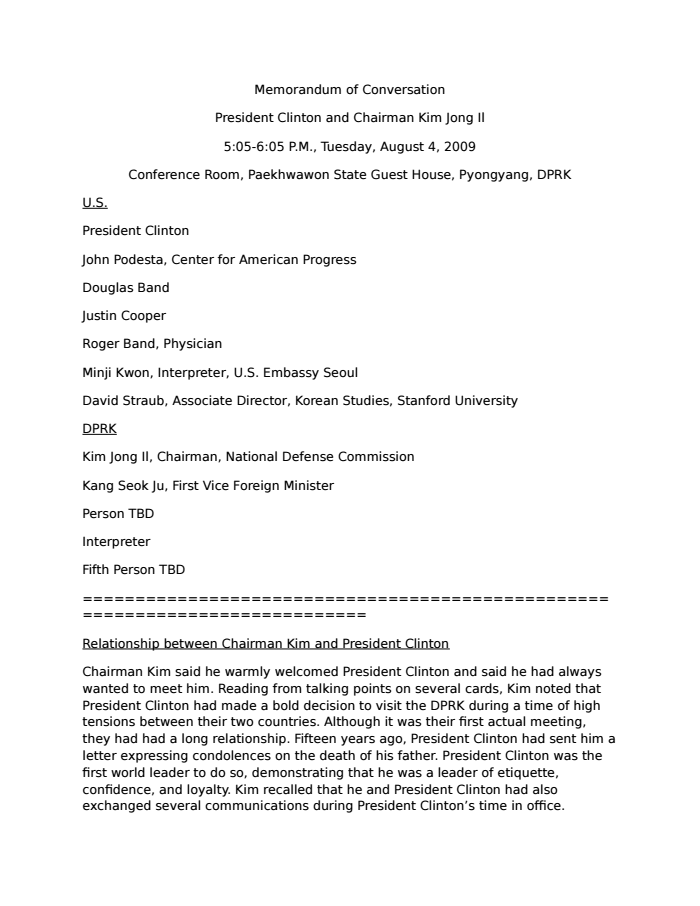
Former President Bill Clinton's 2009 visit to North Korea went so well that the then-ruler of the communist country invited Clinton back to take in the sights, according to a memo attached to a hacked email.
Kim Jong Il, father of current ruler Kim Jong Un, "asked that President Clinton return often, officially and unofficially," suggesting that he visit again "to tour someday when there were no problems in bilateral relations." Clinton seemed open to the idea, saying "he would like someday to visit the beautiful seaside location depicted in the painting in the entry hall of the Paekhwanwon Guest House. Chairman Kim said he would show him a much more beautiful place, and that President Clinton should come back to the DPRK on holiday."
"Chairman Kim said he would show him a much more beautiful place, and that President Clinton should come back to the DPRK on holiday."
The memo was discovered attached to an email sent to John Podesta, who accompanied Clinton on his mission. Podesta, a former White House chief of staff under Clinton and then-head of the liberal Center for American Progress, is now serving as campaign chair for former Secretary of State Hillary Clinton's presidential campaign. WikiLeaks has been slowly publishing emails from Podesta's account, which researchers believe was hacked by Russian hackers, over the past several weeks.
Also accompanying Clinton were Doug Band, the top aide at the Clinton Foundation; Roger Band, Doug's brother and Clinton's physician; and David Straub, a Stanford University professor and the author of the memo according to the signature at the bottom. Straub had sent a draft of the memo to Band, who then forwarded it to Podesta and Cheryl Mills, a top aide at the State Department. BuzzFeed News has reached out to Straub to confirm the authenticity of the memo.
Kim's invitation came at the end of an hourlong meeting between the two men, held during Clinton's attempt to gain the release of two American journalists who had been arrested and jailed. Clinton's efforts were a success and both Laura Ling and Euna Lee were allowed to return to the United States.

Aside from the journalist issue, the two spoke about a range of matters, including: the US–North Korea relationship more broadly; the resumption of the Six Party Talks meant to persuade Pyongyang to give up nuclear weapons; North Korea's relationship with Japan, including Clinton insisting North Korea consider releasing Japanese abductees; and why Clinton hadn't visited sooner. (A last-ditch effort to secure a peace deal between Israel and Palestine forced Clinton to cancel a planned trip to North Korea at the end of his second term, a fact that Clinton was still touchy about nine years later as he brought it up to Kim.)
Clinton and Kim, at least per the memo, appeared to have a good relationship, with Kim looking back fondly on Clinton's time in office. Clinton was the first foreign leader to send Kim condolences on the death of his father, North Korea's founder Kim Il Sung, Kim said.
The former president was also the only person out of a list of high-ranking officials — potentially including his wife, then-Secretary of State Hillary Clinton — that Kim agreed to meet with to discuss the US journalists, per the memo. At one point towards the end of the meeting, Clinton showed just why he may have been chosen when he deployed his trademark charm:
He reiterated that the DPRK must not make President Obama pick between a bilateral relationship and the Six Party Talks. He concluded by noting that as a boy growing up, he had learned the saying that there is more than one way to skin a cat.
Bill Clinton's successor, George W. Bush, on the other hand, wasn't nearly as well liked in Pyongyang, especially after Bush labeled North Korea as part of the "Axis of Evil" in 2003. Kim suggested that the "nuclear issue" — which saw North Korea test its first nuclear weapon in 2007 — would not have gotten nearly to the point it did if Al Gore had won the 2000 presidential election. (North Korea conducted its fifth nuclear test in September.)
"Kim added his personal view that if the Democrats had won in 2000 the situation in bilateral relations would not have reached such a point," the memo reads. "Rather, all agreements would have been implemented, the DPRK would have had light water reactors, and the United States would have had a new friend in Northeast Asia in a complex world."
But the relationship with the newly installed Obama administration wasn't very good either at that point. "Although the United States now had a new administration, the DPRK’s first impressions of it were not very good," the memo says. "President Obama said publicly he was willing to talk even with hostile countries, but he was obstructing the DPRK’s right to send satellites into orbit."
The Obama administration would go on to place economic sanctions on North Korea several times over the course of two terms, both for its nuclear program and for allegedly hacking and releasing emails from Sony Entertainment.
While most of the meeting was cordial, there were definitely some awkward moments according to the memo. One that stands out is a side bar from Straud about Kim's attention span:
Asked by Chairman Kim if he had visited [South Korea] twice while president, Clinton replied that that was correct. President Clinton said he had also recently visited the ROK and had taken the occasion to have dinner with former President Kim Dae-Jung. Chairman Kim said he had heard that President Kim was in critical condition. President Clinton responded that when they had shared dinner, President Kim’s mind was alert but his body was weak. We must rekindle feelings in the [South Korea] about a shared future and supporting each other. [Note: At several points in the latter part of the meeting, Kim engaged in aside exchanges with First Vice Foreign Minister Kang, barely listening to the interpretation of President Clinton’s remarks into Korean.]
And in a moment of speculation, Clinton predicted that though many criticized his trip to North Korea "when the American people see the two women journalists step off the plane in the United States, criticism of the trip will vanish and the American people will want U.S. dialogue with North Korea." That did not wind up being the case.
Kim died in 2011, leaving his son, Kim Jong Un, as the head of North Korea. As of October 2016, Bill Clinton has yet to make good on his desire to visit North Korea in a more casual setting. A spokesperson for Clinton did not immediately respond to an email asking whether the former president still would like to visit the DPRK.

